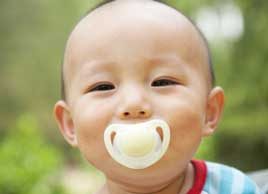Thumb-sucking, pacifiers and your child’s oral health
Sucking on thumbs and pacifiers is natural behaviour for kids, but don’t let it go on too long

Sucking is a natural reflex that helps babies thrive. In fact, your child was probably practising on her fingers and thumbs before she was born. After birth, thumb-sucking or using a pacifier can provide comfort to your infant, and even help her fall asleep.
But as your child gets older, the impact that sucking a thumb or a soother has on her smile can’well, suck. It can interfere with the growth of her mouth and the alignment of her teeth. This is one early habit you’ll want to break before it’s too late.
Thumbs up for soothers
The potential problems may make you reluctant to start your infant on a soother at all. But keep in mind that if your baby likes to suck, it’s a lot easier to limit the use of a soother than it is your child’s thumb. And a pacifier is less painful to part with when the time comes. "You can throw the soother out," points out Dr. Diederik Millenaar, a pediatric dentist in Vancouver. Not so simple when it comes to a thumb.
That doesn’t mean you should be tying up your tyke’s thumbs so he’ll start using a soother instead. If he isn’t sucking with gusto when his thumb is in his mouth, he’s less likely to cause damage. Some kids hold their thumbs in their mouths without sucking, while others suck so hard you can hear a pop when they pull their thumbs out.
Pacifier dos and don’ts
If you do opt for a pacifier, some experts suggest the orthodontic style, rather than the conventional rounded type, because it may be a little easier on the teeth. But studies haven’t shown enough differences to make a case that orthodontic pacifiers are harmless.
Never sweeten a soother‘don’t dip it in corn syrup, for example. The constant contact of sugar and teeth can lead to early decay. And never clean the soother by putting it in your own mouth, since that can transfer bacteria instead of eliminating it.
When to put a stopper in it
Sucking a thumb or soother will have less impact on your child’s teeth if she stops before her permanent teeth come in, around age five. But sucking can have effects long before that. "I like to see the soother gone by about age three. The earlier the better," says Millenaar. The Canadian Paediatric Society recommends starting the process of giving up pacifiers around 12 months of age. Some evidence shows that children who use pacifiers long-term can develop an abnormal swallowing pattern called tongue thrust. They also experience more middle ear infections. Kids who suck their thumbs can have problems with speech development.
Scaling back on the sucking
Fortunately, most thumb-sucking kids naturally cut back on the habit between two and four years of age, as their hands get busier or their peers start to make comments. If sucking persists, parents can encourage children to give it up with positive reinforcement like a sticker chart, and by offering cuddles for comfort. When it comes to a soother, it’ll be easier to quit if your kid is only allowed to use it at sleep time. And as with the thumb habit, it helps to praise or reward your child when she goes without sucking.
It may make a difference if your child’s dentist explains the damage done by soothers or thumb-sucking. Gentle reminders to stop sucking can also help. But remember, children suck to de-stress’so blowing up at them won’t help break the habit!
Fortunately, few children are still sucking thumbs and pacifiers by the time they hit college. But the earlier you can help your child ditch the habit, the better it will be for her oral health.
Don’t miss out! Sign up for our free weekly newsletters and get nutritious recipes, healthy weight-loss tips, easy ways to stay in shape and all the health news you need, delivered straight to your inbox.




